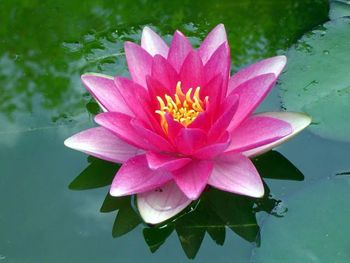(Minghui.org) Yue Fei, a legendary character in Chinese history, is an exemplar of loyalty for generation after generation of Chinese people. From driving off the invading Jurchens, accomplishing impossible feats on the battlefield, to defending the heartland of China—his story has been told time and time again in Chinese history books, dramas, novels, movies, and so on.
Chinese people often express their aspirations through poetry, and Yue was no exception. His poems in the Collection of Yue Wumu and Collection of Song Poems evinced his magnanimous character and lofty ideals.
(Continued from Part 1.)
Here is one of the most famous poems by Yue Fei:
Man Jiang Hong
My mane of fury surges, upsetting my crown,
While against a fence I lean
As the swishing showers cease.
With a heavenward gaze, I release a long shout
Which ascends into the sky,
Roaring bold tenacity.
Thirty years of glory, all ashes and dust—
A thousands-mile journey beneath moon and sun.
Waste not our ages—for our heads, black in youth,
Will whiten
With barren regret when all’s done.
Jingkang’s disgrace we have yet to avenge.
When shall the ministers’ grief meet its end?
Swift flies my chariot beyond Helan’s fringe.
Our hunger we’ll sate with the flesh of Hu swine,
Carousing, we’ll drink Xiongnu blood for our wine.
My crusade renewed, I’ll reclaim all we’ve lost.
Our homeland restored,
To His Majesty I’ll ride.
Written in 1133, this poem fully embodies Yue’s loyalty and determination—a forceful gale that has blown through the land of China for generations. Almost one thousand years have passed since the poem’s writing, but when reading it, one can still sense Yue Fei’s galvanising spirit and sense of justice, as well as his “bold tenacity.”
Indeed, the records from history told of Yue Fei’s unparalleled courage and faith. He was always calm in battle and did not panic, even when his forces were assailed by a sneak attack. When they were bombarded with heavy artillery, Yue Fei would stand his ground while others ducked for cover. And even in the commander’s role, he took the lead and fearlessly charged deep into enemy lines. It’s no wonder that his opponents—the Jurchens—said, “It is easier to move a mountain than to move Yue Fei’s army.”
But Yue’s virtue is equally impressive, if not more so. Despite being a military general, he took great care to avoid harming innocent lives. According to the History of the Song Dynasty, Emperor Gaozong’s mother Queen Dowager Longyou was once harassed by bandits in Qianzhou. When Yue was leading an expedition through the city, the Emperor issued a secret order for his troops to kill everyone in the city as retribution.
Yue pleaded with the Emperor to only execute the enemies of the Song while sparing the civilians, but the Emperor refused. Not to be discouraged, Yue Fei continued pleading, again and again, until Emperor Gaozong had no choice but to agree. As a result, the residents of Qianzhou began to worship Yue’s portrait in gratitude for saving their lives.
Yue ran a tight ship when it came to his army. His discipline was incredibly strict, with one of his rules being that the army, “shall not destroy civilian homes even if freezing to death,” and “shall not steal even if starving to death.” Sometimes, when local residents offered the soldiers free quarters in their homes for the night, the soldiers politely refused and camped outside instead.
However, Yue’s kindness complemented his strictness. When his men fell ill, he’d personally prepare medicine and nurse them back to health. When his generals traveled far away from home, he sent his wife to visit their families and see if they needed help. When his men died in battle, Yue would grieve for them personally and ensure their children were taken care of. When possible, he arranged for his sons to marry the daughters of these deceased soldiers and generals so that they could be supported.
History books recorded that Yue Fei rejected the Emperor five times when he tried to grant Yue Fei the title of Imperial Tutor, because Yue Fei only sought to defend the country instead of profiting himself. Whenever the Emperor rewarded him with money or goods, Yue Fei shared all the spoils with his generals and solders. Although he was a most accomplished general, he never mentioned that in his interactions with others.
Whenever collecting military rations, Yue would worry about the burden on civilians. “The financial resources of residents in the southeast region are exhausted to the extreme,” he once said. After finishing the war in Jinghu area in today’s Hubei Province, he recruited civilians to cultivate the land, and also had his army farm the land. This way, the amount of food needed by the military was reduced by half.
Yue was loyal to the country and had filial piety towards his mother. Because of his many tours, he was rarely home to take care of his mother. After his mother died, he requested a temporary leave to honor her. “If one abolishes filial piety in the name of loyalty, it is putting the cart before the horse,” he wrote. “If one cannot take good care of one’s parents at home, he would not be able to remain loyal to his emperor.”
Zhang Jun, another general, once asked Yue Fei the secret of leading a successful army. “It requires renyi (benevolence and righteousness), wisdom and strategies, honesty and integrity, bravery, and discipline,” Yue replied. “All of these are important.”
(To be continued.)
Copyright © 2023 Minghui.org. All rights reserved.
https://falunau.org/2023/11/poem-yue-fei-loyalty-kindness/

